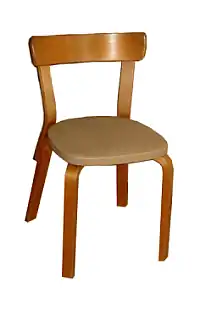chair
English
Alternative forms
- chur (Bermuda)
Etymology
From Middle English chayer, chaire, chaiere, chaere, chayre, chayere, from Old French chaiere, chaere, from Latin cathedra (“seat”), from Ancient Greek καθέδρα (kathédra), from κατά (katá, “down”) + ἕδρα (hédra, “seat”). Displaced native stool and settle, which now have more specialised senses. Doublet of cathedra and chaise.
Pronunciation
- (Received Pronunciation) IPA(key): /t͡ʃɛə(ɹ)/
- (General American) IPA(key): /t͡ʃɛɚ/
- (dialectal or obsolete) IPA(key): /t͡ʃɪə(ɹ)/[1]
Audio (US) (file) Audio (UK) (file) - Rhymes: -ɛə(ɹ)
- Homophone: chare
Noun

A chair (item of furniture).

Chairs (rail supports on a railway).
chair (plural chairs)
- An item of furniture used to sit on or in, comprising a seat, legs or wheels, back, and sometimes arm rests, for use by one person. Compare stool, couch, sofa, settee, loveseat and bench.
- 1918, W[illiam] B[abington] Maxwell, chapter XII, in The Mirror and the Lamp, Indianapolis, Ind.: The Bobbs-Merrill Company, →OCLC:
- There were many wooden chairs for the bulk of his visitors, and two wicker armchairs with red cloth cushions for superior people. From the packing-cases had emerged some Indian clubs, […], and all these articles […] made a scattered and untidy decoration that Mrs. Clough assiduously dusted and greatly cherished.
- 1963, Margery Allingham, chapter 19, in The China Governess:
- Meanwhile Nanny Broome was recovering from her initial panic and seemed anxious to make up for any kudos she might have lost, by exerting her personality to the utmost. She took the policeman's helmet and placed it on a chair, and unfolded his tunic to shake it and fold it up again for him.
- All I need to weather a snowstorm is hot coffee, a warm fire, a good book and a comfortable chair.
-
- (often with definite article, also written Chair) Clipping of chairperson.
- Under the rules of order adopted by the board, the chair may neither make nor second motions.
- 1658 March 23, Thomas Burton, John Towill Rutt, editor, Diary, London: Henry Colburn, published 1828, page 243:
- The Chair behaves himself like a Busby amongst so many school-boys […] and takes a little too much on him.
- 1887 September 5, The Times:
- It can hardly be conceived that the Chair would fail to gain the support of the House.
- 2020 June 3, Lilian Greenwood talks to Paul Stephen, “Rail's 'underlying challenges' remain”, in Rail, page 34:
- She adds: "I'd also like to think that as chair I was friendly but firm. I wanted to encourage people to give evidence, while there are others who need to be coaxed, held to account and asked tough questions."
- (music) The seating position of a particular musician in an orchestra.
- My violin teacher used to play first chair with the Boston Pops.
- (rail transport) An iron block used on railways to support the rails and secure them to the sleepers, and similar devices.
- (chemistry) One of two possible conformers of cyclohexane rings (the other being boat), shaped roughly like a chair.
- (informal, with the) Ellipsis of electric chair (“device used for performing execution”).
- The court will show no mercy; if he gets convicted, it's the chair for him.
- 1920 June 1, The Electrical Experimenter, New York, page 216, column 2:
- "It was me. And I'm glad, damned glad, I didn't croak him. With this slick guy after me, it would be me for the chair."
- 1934, Agatha Christie, chapter 8, in Murder on the Orient Express, London: HarperCollins, published 2017, page 251:
- 'All for a pig of a man who should have gone to the chair.'
- 1949, Isobel Lennart, Holiday Affair, spoken by Carl Davis (Wendell Corey):
- Believe it or not, it only looked like I was trying to send you to the chair.
- (education) A distinguished professorship at a university.
- 2014 April 12, Michael Inwood, “Martin Heidegger: the philosopher who fell for Hitler [print version: Hitler's philosopher]”, in The Daily Telegraph (Review), London, page R11:
- In 1928 [Martin] Heidegger succeeded [Edmund] Husserl to take a chair at Freiburg […]
-
- A vehicle for one person; either a sedan borne upon poles, or a two-wheeled carriage drawn by one horse; a gig.
- 1591 (date written), William Shakespeare, “The Second Part of Henry the Sixt, […]”, in Mr. William Shakespeares Comedies, Histories, & Tragedies. […] (First Folio), London: […] Isaac Iaggard, and Ed[ward] Blount, published 1623, →OCLC, [Act II, scene v], page 104, column 2:
- Enter Mortimer, brought in a Chayre, and Iaylors.
- 1777, Richard Brinsley Sheridan, The School for Scandal, IV.iii:
- She always leaves her Chair at the milliner's in the next Street.
- 1712, Alexander Pope, “The Rape of the Lock”, in The Beauties of Pope, London: G. Kearsley, published 1783, page 32:
- Think what an equipage thou haſt in air,
And view with ſcorn two pages and a chair.
- 1837, L[etitia] E[lizabeth] L[andon], Ethel Churchill: Or, The Two Brides. […], volume II, London: Henry Colburn, […], →OCLC, page 211:
- The chairs came at the appointed hour, and Ethel could not but be amused at the glimpses she had of the park along which they were carried; although haunted by misgivings as to the judiciousness of their destination. They were set down in a hall of large dimensions, hung round with portraits, and filled with servants, who had more the air of guards.
-
- The seat or office of a person in authority, such as a judge or bishop.
Derived terms
- Adirondack chair
- arm-chair
- armchair
- banana chair
- bar chair
- barber chair
- barber-chair
- Barcelona chair
- basket chair
- bath chair, Bath chair
- beach chair
- birth chair
- birthing chair
- boatswain's chair
- bosun's chair
- bowl chair
- camping chair
- chair bed
- chair conformation
- chair days
- chair lift
- chair mat
- chair organ
- chair plug
- chair rail
- chair umpire
- chair-lift
- chairholder
- chairman
- chairness
- chairperson
- chairwoman
- club chair
- co-chair
- confessional chair
- deck chair
- deck-chair
- desk chair
- dining chair
- Eames chair
- ear chair
- easy chair
- easy-chair
- elbow chair
- elbow-chair
- electric chair
- Elijah chair
- empty chair
- endowed chair
- feeding chair
- fighting chair
- first chair
- flag chair
- folding chair
- fountain chair
- game chair
- gaming chair
- geri chair
- geriatric chair
- gestatorial chair
- give someone the chair
- grandfather chair
- grandfather's chair
- guest chair
- half-chair
- high chair
- hot chair
- ice cream chair
- ice-cream chair
- invalid chair
- Judas chair
- kneeling chair
- lady's chair
- lawn chair
- lounge chair
- massage chair
- Mendlesham chair
- mercy chair
- Merlin chair
- monk chair
- monk's chair
- Morris chair
- musical chairs
- Muskoka chair
- night chair
- nursing chair
- office chair
- papasan chair
- patio chair
- planter's chair
- pull up a chair
- reception chair
- revolving chair
- rocking chair
- rocking chair money
- rocking-chair
- rocking-chair money
- rolling chair
- Roman chair
- rotating chair
- sedan chair
- semi-easy chair
- side chair
- sledge chair
- slipper chair
- socialism of the chair
- socialist of the chair
- soda fountain chair
- spectator chair
- steamer chair
- step chair
- swivel chair
- swivel-chair
- take a chair
- take the chair
- tiger chair
- tramp chair
- tub chair
- vice chair
- vice-chair
- walking chair
- wheelchair
- Windsor chair
- wing chair
- wingback chair
- X-chair
Descendants
Translations
furniture
|
chairperson — see chairperson
distinguished professorship
|
- The translations below need to be checked and inserted above into the appropriate translation tables. See instructions at Wiktionary:Entry layout § Translations.
Translations to be checked
|
Verb
chair (third-person singular simple present chairs, present participle chairing, simple past and past participle chaired)
- (transitive) To act as chairperson at; to preside over.
- Bob will chair tomorrow's meeting.
- 2020 May 20, “Merriman praised over handling of TSC's 'virtual' transition”, in Rail, page 12:
- Greenwood told RAIL she was disappointed that Parliamentary rules prevented her from chairing the TSC [Transport Select Committee] beyond last December's General Election, [...] She added: "I'm gutted I'm no longer able to chair the committee, I'm not going to lie. But I know it's in good hands and I'm still able to play my part as a member in the work we're doing.
- (transitive) To carry in a seated position upon one's shoulders, especially in celebration or victory.
- 1896, A. E. Houseman, “To An Athlete Dying Young,”, in A Shropshire Lad:
- The time you won your town the race
We chaired you through the marketplace.
-
- (transitive, Wales, UK) To award a chair to (a winning poet) at a Welsh eisteddfod.
- The poet was chaired at the national Eisteddfod.
Translations
to act as chairperson
|
References
- Stanley, Oma (1937), “I. Vowel Sounds in Stressed Syllables”, in The Speech of East Texas (American Speech: Reprints and Monographs; 2), New York: Columbia University Press, , →ISBN, § 6, page 16.
French
Etymology
From Middle French chair, char, from Old French char, charn (earlier carn), from Latin carnem, accusative of carō, from Proto-Italic *karō, from Proto-Indo-European *ker-, *(s)ker-. Doublet of carne.
Pronunciation
Derived terms
Related terms
Further reading
- “chair”, in Trésor de la langue française informatisé [Digitized Treasury of the French Language], 2012.
Gallo
Verb
chair
- Alternative form of chaeir
- Une avion san liméro qu'est chaite ste netey à Eastdown dan le Sussex
- A plane without number that has crashed this night at Eastdown, Sussex
Manx
Old French
This article is issued from Wiktionary. The text is licensed under Creative Commons - Attribution - Sharealike. Additional terms may apply for the media files.